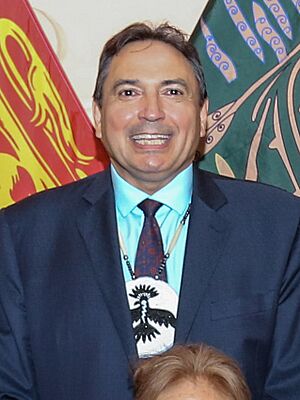Perry Bellegarde facts for kids
Quick facts for kids
Perry Bellegarde
|
|
|---|---|

Bellegarde in 2019
|
|
| National Chief of the Assembly of First Nations | |
| In office December 10, 2014 – July 8, 2021 |
|
| Preceded by | Ghislain Picard (interim) |
| Succeeded by | RoseAnne Archibald |
| Personal details | |
| Born | August 29, 1962 Fort Qu'Appelle, Saskatchewan |
| Spouse | Valerie Galley Bellegarde |
| Residences | Ottawa, Ontario |
| Education | Saskatchewan Federated Indian College, University of Regina |
| Alma mater | University of Regina |
Perry Bellegarde (born August 29, 1962) is an important Canadian First Nations leader. He was the National Chief of the Assembly of First Nations (AFN) from December 10, 2014, to July 8, 2021. Before this, he was a chief for his own community, the Little Black Bear First Nation. He also led the Federation of Saskatchewan Indian Nations and was a regional chief for the AFN in Saskatchewan.
Contents
Early Life and Education
Perry Bellegarde was born in 1962 in Fort Qu'Appelle, Saskatchewan. He grew up on the Little Black Bear Indian reserve. He went to elementary and high school in nearby towns.
After high school, he studied at the Saskatchewan Federated Indian College. This college is now known as the First Nations University of Canada. Later, he studied business at the University of Regina. After finishing his studies, he worked as a director for the Indian Institute of Technologies.
Starting His Political Journey
In 1986, Perry Bellegarde became involved in tribal politics. He was elected to the Touchwood–File Hills–Qu’Appelle Tribal Council. In 1988, he became the President of this council.
He worked to give First Nations control over the Fort Qu’Appelle Indian Hospital. He also helped create a new center in Regina to provide services for First Nations people.
Awards and Recognition
Perry Bellegarde has received many awards for his leadership. These include the Canada 125 Medal and the Saskatchewan Centennial Medal. He also received the Queen's Golden and Diamond Jubilee Medals. In 2018, he was given the Saskatchewan Order of Merit (SOM). This is a high honor from the Province of Saskatchewan.
Leading in Saskatchewan
In May 1998, Bellegarde became the Chief of the Federation of Saskatchewan Indian Nations. This group represents First Nations across Saskatchewan. In this role, he also became a regional vice-chair for Saskatchewan in the Assembly of First Nations (AFN). He held this position until 2003.
He was re-elected to this role in 2012. During this time, he supported Neil Young's "Honour the Treaties" concert tour in 2014. This tour raised money to help the Athabasca Chipewyan First Nation in their legal fight. They were working to protect their lands from oil sands development.
National Chief of the AFN
Perry Bellegarde was a strong candidate for National Chief of the AFN in 2009. He ran in the election but was defeated by Shawn Atleo. He did not run in the 2012 election.
After Shawn Atleo resigned in 2014, another election was held. Bellegarde ran again and won on the first try.
Key Priorities as National Chief
One of his first goals was to get the Canadian government to support an investigation. This investigation looked into the high number of missing and murdered Indigenous women. This issue was very important to First Nations people in the 2010s. He helped the new Liberal government start this inquiry on August 3, 2018.
In June 2017, Bellegarde marched in the Toronto Pride Parade. He was the first AFN National Chief to do this. Prime Minister Justin Trudeau also marched in the event.
On July 25, 2018, Bellegarde was re-elected for a second term as National Chief. He encouraged Indigenous nations to create their own citizenship laws. He believed these laws should go beyond the Indian Act. During his re-election campaign, some people said he was too close to Prime Minister Justin Trudeau.
Working with the Government
In 2019, Bellegarde signed an agreement with the Canadian government. This led to a new law called Bill C-92: An Act respecting First Nations, Inuit and Métis children, youth and families. This bill aimed to give Indigenous governments control over child welfare. Before this, many Indigenous children were taken from their communities by social services. This often caused them to lose touch with their families and cultures. The bill helped transfer this power to Indigenous governments. Bellegarde also worked to negotiate with provincial governments about this bill.
During the 2020 Canadian pipeline and railway protests, he supported the protesters. He said that people should not be treated as criminals for protecting their lands. He also called for a peaceful end to the situation.
In March 2020, he met with the Prime Minister and provincial leaders. He worked with leaders from the Inuit Tapiriit Kanatami and Métis National Council. They wanted the UN Declaration on the Rights of Indigenous Peoples to become Canadian law.
On March 24, 2020, the Assembly of First Nations declared a state of emergency. This was because of the serious risk the COVID-19 pandemic in Canada posed to Indigenous communities. Bellegarde asked for Indigenous people to be directly involved in planning for the pandemic.
In June 2020, he called for big changes to policing in Canada. He suggested more community-based policing and strict rules against excessive force. He also wanted more civilian oversight after several police killings of Indigenous people.
On December 7, 2020, he announced he would not seek re-election. He wanted to focus on important work before his term ended in July 2021. This included the passage of Bill C-15.
Later Honours
Perry Bellegarde received an Honorary Doctorate in Laws on June 2, 2022. This was from Lakehead University in Ontario, Canada.
 | Ernest Everett Just |
 | Mary Jackson |
 | Emmett Chappelle |
 | Marie Maynard Daly |

